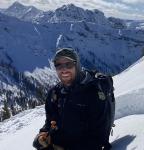The GNFAC is looking for an intern for the 2025-'26 winter season. Application deadline is April 6, 2025.
Blog List

Right now it's a tricky balance, and it's hard to say if the snowpack is stable or unstable. More snow is making it unstable but will also help it become strong and stable in the future.

The snowpack was historically low from when we started forecasts on December 7th through the beginning of February. We had long dry spells interrupted by a couple “storm cycles”. Snowfall was minimal with 1-2” of SWE over a week in December, and 2-4” of SWE over 2-3 weeks in January.

We just ended our 34th year of operation. This winter was challenging on several fronts, with an unusually late start to the season and a persistent weak layer that created unprecedented instability.

The GNFAC is looking for an intern for the 2024-'25 winter season. Application deadline is April 5, 2024.

In 9 years of avalanche forecasting I have not seen a snowpack so weak. When I thought the snowpack was bad in past seasons, it wasn’t this bad.

By Dave Zinn, Forecaster, Gallatin National Forecast Avalanche Center

Clicking into our skis or jumping on our sleds in search of powder is a universal mission at winter trailheads throughout North America. While the enjoyment is undeniable, the risks are real. Weather, avalanches, breakdowns, yard sales, and being thrown from a sled like a bronc rider are things we accept.

After a warm start to fall, winter abruptly began with 1-3 feet of snow in the mountains on October 22-24. Like most of the west, southwest Montana had average to above average snow and cold temperatures the entire season. These conditions brought plenty of avalanche activity.

We just ended our 33rd year of operation with a winter of cold temperatures, above average snowfall and snow depth measuring 100% to 152% of normal on April 1. After a few anemic seasons this was a reminder that the snowfall pendulum swings both directions.
Click .PDF below for full season summary.

The GNFAC is looking for an intern for the 2023-'24 winter season. Application deadline is April 30, 2023.

Anyone who travels in the mountains when there is snow on the ground needs to know how to avoid being caught in an avalanche. This includes hunters who chase game like deer, elk, sheep and mountain goats. Read the full .pdf to learn more about avalanche avoidance.


The GNFAC is looking for an intern for the 2022-'23 winter season. Application deadline is April 22, 2022.

We just ended our 32nd year of operation. It was a low snow year with snowpack totals 70-80% of normal.

All winter we talked about weak, sugary snow near the base of the snowpack creating unstable conditions, especially in the mountains near Bozeman, Big Sky and West Yellowstone. From late October through November the mountains received 2-4 feet of snow, followed by mostly dry and cold weather through mid-December.

We just ended our 31st year of operation after a winter of increased backcountry traffic on an avalanche prone snowpack. The season started on October 14 with an early season snowstorm and first recorded avalanches. We issued 12 early season bulletins before the start of the daily forecasts which ran for 121 days from December 12 to April 11.

Snow stability tests provide information about the likelihood of avalanching on slopes with a similar snow structure.

In the Rocky Mountains early season snow is typically not good for stability.

Winter is not going down without a fight, but we have concluded our 30th season of daily avalanche forecasts. A 10” early snowstorm prompted our first bulletin of the year on September 26. Snow continued, folks flocked to the mountains and we issued 17 bulletins before our daily advisories started on November 30.
